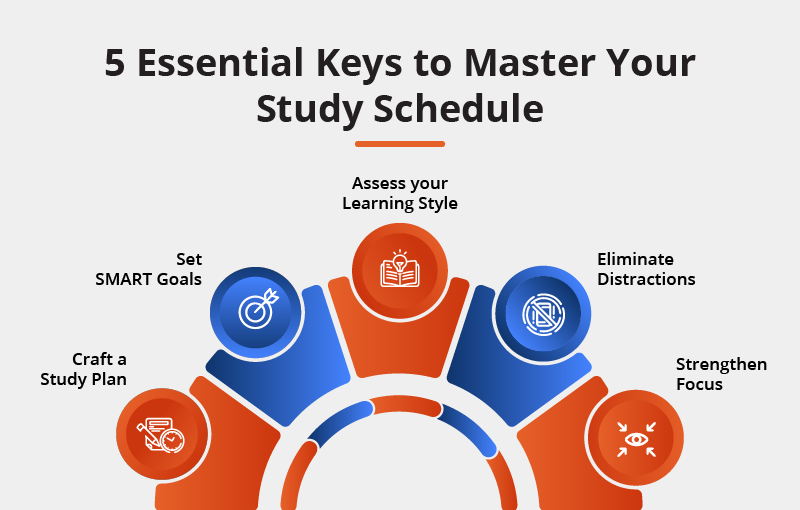5 Essential Keys to Create Your Study Schedule

Creating a study schedule can be overwhelming, but it doesn’t have to be. Here you’ll gain some very powerful practical tips for assessing your learning style, setting SMART goals, eliminating distractions, and tracking progress. Stay tuned for a personalized approach to achieving academic success!

Assess your learning style
Understanding your learning style is key to creating a winning study schedule. Some students may be visual learners, while others may be auditory or kinesthetic learners. It’s important to identify which category you fall under and create a study environment that caters to your style. Extramarks Learning App gives you a broader spectrum to learn at your own pace and in your own comfort. If you’re a visual learner, creating mind maps or diagrams could be useful. For auditory learners, recording lectures or reading aloud may be helpful. Kinesthetic learners may benefit from incorporating physical activity into their study breaks. By understanding your learning style and creating a conducive study environment, you can maximize your learning potential.
Set SMART Goals
If you want to create a study schedule that works, you need to set SMART goals. This means creating Specific, Measurable, Achievable, Relevant, and Time-bound goals. Specific goals help you focus on a specific outcome, while measurable goals ensure you can track your progress. Achievable goals make sure that they are possible to achieve with the resources you have, while relevant goals are in line with your overall objectives. Also, if you are interested in knowing how to excel in your exam responses, try checking out the link here… ( Extramarks Learning App ) Lastly, time-bound goals keep you accountable and ensure that you have a deadline to work toward. By setting SMART goals, you can make sure that you stay on track and have clear targets to work toward. But remember, it’s important to be flexible and adjust your goals as needed to stay motivated and on track.
Make a study plan
Making a study plan is crucial to achieving academic success. To start with, prioritize your work by breaking it down into smaller, more manageable tasks. This not only helps you manage your time better but also eases you into the studying mindset. In addition to that, including mini-breaks throughout your study sessions can help increase productivity. When creating a study plan, it’s also important to include physical activity. Going for a walk or doing some light exercise can help refresh your mind and energize you for further studies. Remember, a study plan is not set in stone and can be modified based on your needs and progress. So don’t be afraid to adjust your schedule as necessary.
Eliminate Distractions
It is obvious that it’s tempting to scroll through social media or text your group chat, but with a bit of discipline, eliminating your distractions is definitely doable. First, identify what’s taking away your focus. Is it your phone, the TV, or your loud roommate? Once you determine what it is, take action. Put your phone on silent, or better yet, in a different room. Consider investing in noise-cancelling headphones to help you concentrate. Also, creating a dedicated study space can help separate work from play. Keep tidy and comfortable for ultimate productivity.
Strengthen your focus
Strengthen your focus by practicing mindfulness, taking breaks, and getting enough sleep. Mindfulness can help you stay in the present moment while taking breaks can give your brain time to rest and process information. Sleep is also crucial to maintaining focus and retaining information. So, make sure to take care of yourself both mentally and physically to help you stay on track with your study schedule. Remember, it’s not just about studying harder, but also smarter.
Track and Evaluate Progress
Track progress and stay accountable to your schedule by regularly reviewing your progress and adjusting your plan accordingly to meet your goals. Whether it is crossing off completed tasks or using a study app, find a method that works for you to ensure you’re staying on track.
While delving into the mastering of the study schedule, we’ve paved the way for our next exploration. In our previous blog, “6 crucial mistakes to avoid on exam day”, we provided insights into the mistakes one should avoid during an exam, creating a solid foundation for your exam success. To know how to keep yourself motivated during the exam season, click here, “7 Effective Strategies to Stay Motivated During Exam Season”
Conclusion
By following the tips and techniques mentioned in this guide for creating a winning study schedule, you can ensure that you are making the most of your study time. Remember to assess your learning style, set SMART goals, make a study plan, eliminate distractions, and strengthen your focus. Tracking and evaluating your progress is important to staying accountable and motivated. Give yourself space and grace to make adjustments and keep progressing towards your goals. You got this!
Last Updated on April 16, 2025










